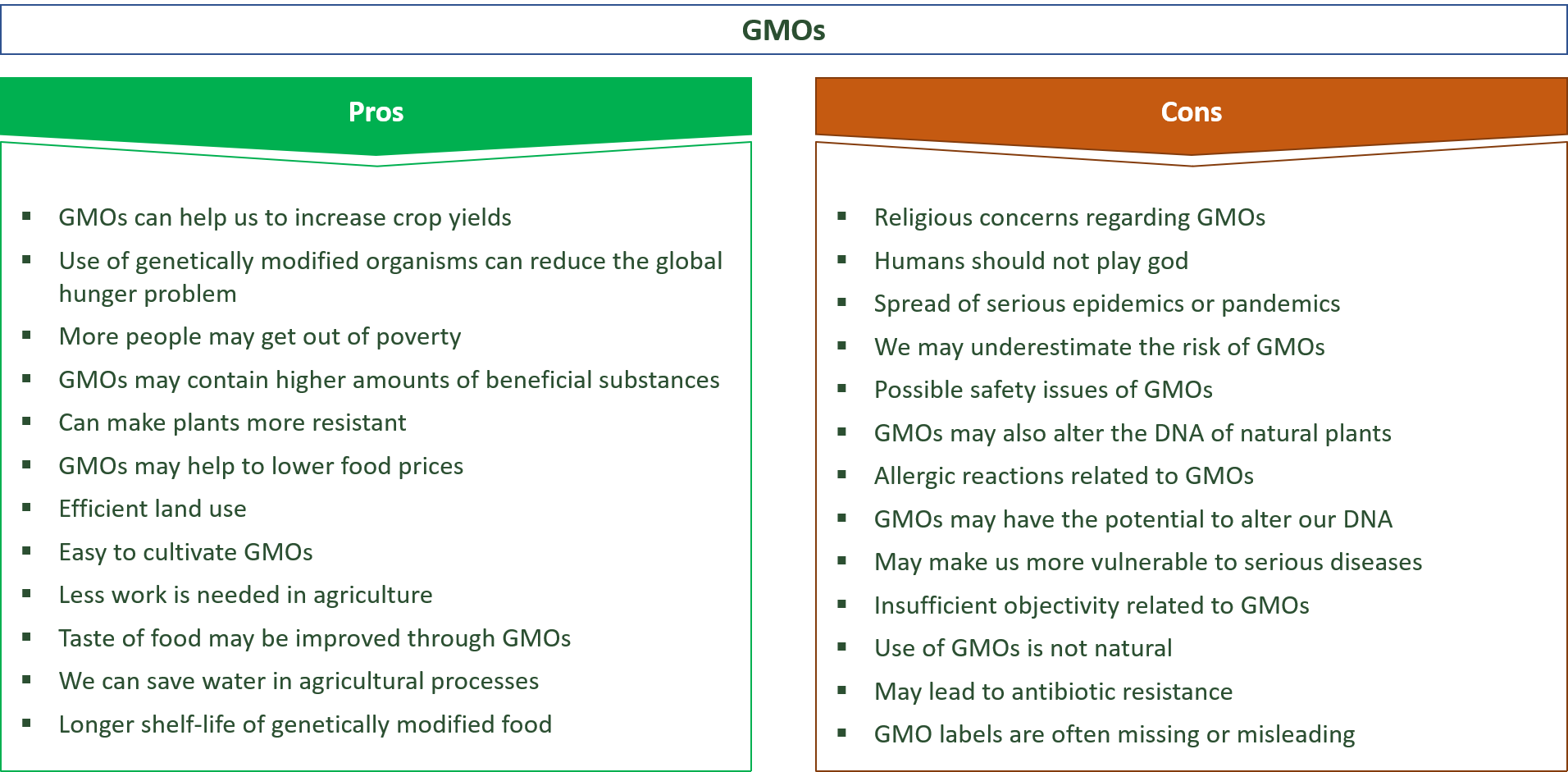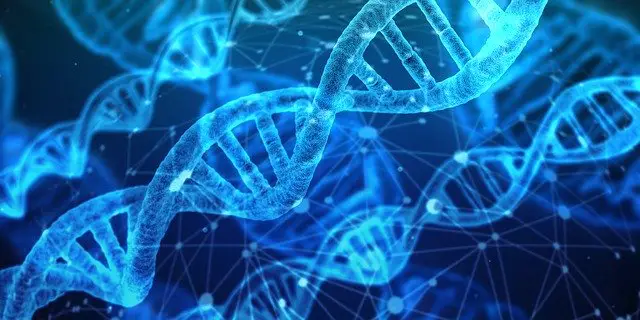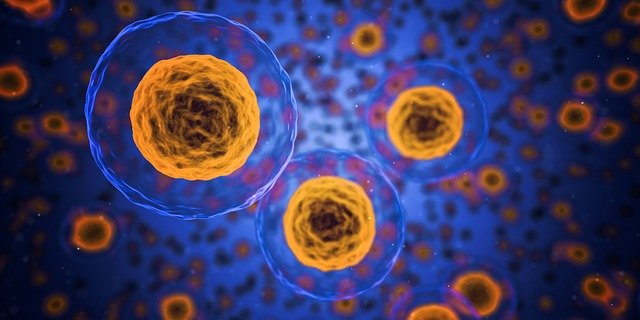“There are GMO skeptics more in Europe maybe than in other places, but not exclusively.”
Bill Gates, Businessman
Advantages & Disadvantages of GMOs

Genetically modified organisms are organisms whose genetics have been manipulated through the use of genetic engineering.
The use of GMOs has become quite popular for a variety of different purposes.
Even though there are many chances of using GMOs, there are also many dangers related to them.
In this article, the pros and cons of GMOs are examined in detail.
Audio Lesson
Contents
Advantages of GMOs
- GMOs can help us to increase crop yields
- Use of genetically modified organisms can reduce the global hunger problem
- More people may get out of poverty
- GMOs may contain higher amounts of beneficial substances
- Can make plants more resistant
- GMOs may help to lower food prices
- Efficient land use
- Easy to cultivate GMOs
- Less work is needed in agriculture
- Taste of food may be improved through GMOs
- We can save water in agricultural processes
- Longer shelf-life of genetically modified food
- Less need to use large amounts of pesticides
- GMOs may be important to feed our growing world population
GMOs can help us to increase crop yields
One key advantage of GMOs is that they can greatly help farmers around the world to increase their crop yields.
Farmers often have to rely on rather weak plant strains, which are usually quite vulnerable to the spread of diseases.
This also implies that these farmers often lose a significant portion of their crop yield to pests.
Moreover, also the growth behavior of plants is often not optimal.
Thus, in order to mitigate those issues and to optimize crop yields, GMOs can be used since those types of crops guarantee optimal growth behavior and higher yields.
Especially in countries where agriculture is still done in a rather inefficient manner, the use of GMOs can have a huge impact on crop yields.
Use of genetically modified organisms can reduce the global hunger problem
If crop yields are much higher due to the use of GMOs in agriculture, chances are that also more people will get enough food in order to develop in a healthy manner.
Getting enough food is crucial that our body and our brain can work properly.
Especially for children, sufficient food is decisive in order to assure proper growth of these children.
However, in many poor countries all over the world, the local population still suffers from significant hunger and even starvation.
Hence, for those regions, it is crucial to improve the farming conditions in order to produce higher crop yields.
One way to do this is to use GMOs, which can produce much higher yields on average.
In turn, there will be more food for the local population and the hunger problem can be mitigated to a certain extent.
More people may get out of poverty
Another benefit of GMOs is that more people will be able to get out of poverty.
A proper diet is quite important so that our body and our brain can work in an optimal manner.
Thus, if people get more food due to the use of GMOs in agriculture, they will also have more power and better mental capacities to learn and to progress.
In turn, more of those people will be able to get proper education and to get out of poverty at one point in time.
Moreover, not only the general public, but also many small farmers will greatly profit from GMOs since they will be able to increase their profits and farmers who had been barely able to survive without GMOs may now be able to get out of poverty pretty easily due to much higher yields.
GMOs may contain higher amounts of beneficial substances
The crops that can be produced with the help of genetic engineering can also contain higher amounts of nutrients, vitamins and other beneficial components compared to crops from non-GMO plants.
Consequently, GMOs can not only help to increase overall crop yields, they can also help us to supply the general public in poor countries with higher levels of nutrients, which can be quite important to strengthen the immune system of those people and to give them more power so that they can master several difficulties in their daily life.
Can make plants more resistant
Another upside of genetically modified organisms is that they are often also more resistant against certain pests and plant diseases.
In many countries all over the world, farmers often lose a significant fraction of their yield due to pests or unwanted insects.
However, through the use of GMOs, the plants will be better able to protect themselves against pests and crop losses due to pests may be significantly lower.
GMOs may help to lower food prices
Since farmers may be able to produce more crops if they use GMOs, chances are that also the local food prices will decrease over time.
In many cases, especially in poor countries of our planet, the local population will suffer from serious unemployment and many people will not be able to afford to buy basic food in order to survive.
Even people who work quite hard often only earn quite poor wages and are also often not afford too much food.
Hence, in order to improve the conditions for those people, GMOs can greatly help since through a reduction in food prices, poor people will be able to afford more food, which is crucial to stay healthy and full of energy in order to manage their harsh daily life.
Efficient land use
It is also crucial that we as humanity as a whole use our land as efficiently as possible in order to solve several environmental problems.
However, in many countries, agriculture is still done in a rather inefficient manner and the crop yields per square foot are quite low.
This is due to the fact that many farmers still don’t use sufficient amounts of fertilizer.
It is also due to the fact that farmers often use strains that are quite vulnerable.
Therefore, a significant fraction of crop yields is lost each year, which also implies serious levels of inefficiencies in agricultural processes.
Therefore, GMOs can also be used in order to optimize the efficiency of agricultural processes.
Easy to cultivate GMOs
Another upside of GMOs is that they are also quite easy to use.
Since they are often more resistant compared to strains that have not been genetically modified, farmers will also have quite an easy time cultivating those plants since they are designed to protect themselves against many adverse outside influences and farmers cannot mess it up too much anymore.
Hence, GMOs can also greatly facilitate agricultural processes, which can be quite beneficial, especially for young farmers who often do not have sufficient knowledge in agriculture yet.
Less work is needed in agriculture
In general, through the use of GMOs in agriculture, farmers will also have less work since plants are often more resistant and farmers don’t have to put in too much manual effort anymore.
This is quite important since it gives farmers all over the world more time to do whatever they want to do.
Those farmers may even be able to invest time in a side-hustle, which may turn into a serious job in the future or can make at least some additional money.
In turn, more farmers may be able to get out of poverty thanks to the additional time they have to invest in projects that are not linked to agriculture.
Taste of food may be improved through GMOs
Plant genetics also determine how our food will taste.
Therefore, if we are able to modify plant and crop genetics, chances are that we will also learn to alter the taste of vegetables and fruits over time.
In the long run, this can also lead to a state where our food may taste much better, which in turn can greatly improve our overall quality of life.
However, it is not yet clear to what extent this will ever be possible.
We can save water in agricultural processes
Another important chance of GMOs is that we can also save plenty of water in agriculture over time.
Many people all over the world think that water is an endless resource and that we don’t have to save water due to that.
Moreover, in many countries, tap water is quite cheap and therefore, many people also don’t value this resource in the way it should be valued.
In fact, water is vital for all life on earth and in the near future, it will become a quite scarce resource due to global warming.
In fact, many millions of people, especially in the Southern hemisphere of our planet, will suffer from serious water scarcity in the future.
Therefore, it is crucial that we save as much water as possible in various parts of our daily life.
One opportunity to save water in agriculture is to use genetically modified organisms since they often need far less water compared to conventional crops.
Longer shelf-life of genetically modified food
The genetics of crops can also be modified in a way that those crops will have a much longer shelf-life compared to crops that have not been modified.
Many grocery stores and also private persons throw away plenty of food every day and in order to reduce our food waste, it is crucial that we rely on crops that have a longer shelf-life.
Thus, genetic engineering also has the potential to reduce our overall food waste.
Less need to use large amounts of pesticides
Since GMOs are often designed to have pest-resistant characteristics, there will also be less need to use excessive amounts of pesticides in agricultural processes.
The use of pesticides can be quite harmful to our environment since it pollutes the soil and it also attacks many other living organisms.
Hence, in order to prevent those adverse effects, GMOs can be used so that there will be less need for pesticide use.
GMOs may be important to feed our growing world population
Our world population is growing at a rapid speed and overpopulation will become a serious problem over the next decades.
In order to feed all those people on our planet, we have to significantly increase our crop yields.
GMOs can also greatly help us in this regard since agricultural processes can be optimized and also the yields will be much higher on average.
Hence, GMOs can also help to mitigate the adverse effects of the overpopulation problem to a certain extent.

Disadvantages of GMOs
- Religious concerns regarding GMOs
- Humans should not play god
- Spread of serious epidemics or pandemics
- We may underestimate the risk of GMOs
- Possible safety issues of GMOs
- GMOs may also alter the DNA of natural plants
- Allergic reactions related to GMOs
- GMOs may have the potential to alter our DNA
- May make us more vulnerable to serious diseases
- Insufficient objectivity related to GMOs
- Use of GMOs is not natural
- May lead to antibiotic resistance
- GMO labels are often missing or misleading
- Many people just don’t even know that they eat genetically modified food
- GMO research often also implies the need for animal testing
- Plants may become less resistant against pests over time
- Technology behind GMOs may not be mature yet
- GMOs may also affect animals
- Long-term consequences are still unclear
Religious concerns regarding GMOs
Apart from the various important advantages of GMOs, there are also many issues related to those genetically modified organisms.
One problem with GMOs is that they may violate some religious beliefs or other cultural values.
Many religious people think that those kinds of genetic manipulation should not be tolerated since they are against human nature and may do more harm than good in the long run.
Humans should not play god
Opponents of genetic engineering also often claim that humans should not play god and that the use of GMOs goes way too far.
We should not be able to alter the DNA of other living organisms since this is a privilege that only god should have.
Hence, especially in regions where the majority of the general public is quite skeptical regarding the concept of GMOs, genetically modified organisms may have not a bright future in those regions.
Spread of serious epidemics or pandemics
Even though GMOs are usually meant to improve the living conditions of millions or even billions of people on our planet, quite the opposite can happen if genetic engineering gets out of control and genetically modified bacteria can spread.
In turn, this can lead to serious epidemics or even pandemics.
Also if the technology behind GMOs falls into the wrong hands, fundamentalists may use them in order to threaten the lives of millions of people.
Thus, GMOs should be used with great care in order to avoid the spread of serious diseases.
We may underestimate the risk of GMOs
In general, many researchers seem to greatly underestimate the risks that are implied by the use of GMOs on a global scale.
In fact, genetic engineering is a rather new concept and in many cases, we will actually have no idea about the real consequences of GMO usage.
Therefore, humanity should take great care in order not to underestimate the risks that are implied by the use of genetically modified organisms.
Possible safety issues of GMOs
It is also yet rather unclear how big the safety issues of GMOs really are.
However, it should be clear that the use of those genetically modified organisms will pose some risk and in order to minimize the risk for catastrophic outcomes, governments all over the world should spend large amounts of money on R&D subsidies related to GMOs.
GMOs may also alter the DNA of natural plants
Another disadvantage of GMOs is that not only the DNA of one plant species is altered, also the DNA of wild natural plant species could be altered in the long run.
Insects will eat parts of the GMOs and will therefore alter their own DNA.
Moreover, also the DNA of natural plant species will get altered over time since those plants may get pollinated with the pollen from GMOs and as a result, hybrids will be borne that carry both the natural and the GMO DNA inside them.
This can greatly alter the natural fauna and the long-term effects of the spread of those hybrids are still unclear.
Allergic reactions related to GMOs
Researchers also found that GMOs can also increase the risk of allergic reactions of people.
However, quite little is known about how GMOs can cause allergic reactions and how those reactions can be prevented.
Thus, in order to make GMOs safer for human use, plenty of research has still to be done in order to minimize the risk of those allergic reactions.
GMOs may have the potential to alter our DNA
Our DNA evolved over many thousands of years and for a good reason.
We as humanity have adapted to many different circumstances and our body and our brain developed in order to solve problems as best as possible.
Therefore, our DNA can be considered to be optimized as best as possible up to this point.
However, through the consumption of GMOs, chances are that our genetics will get modified over time, which may not be in our best interest as a species since the long-term effects are quite unclear yet.
Consequently, we should be quite careful with GMOs in order not to destroy our valuable genetic material.
May make us more vulnerable to serious diseases
Even though genetic engineering is meant to do the opposite, it can also make us much more vulnerable to new diseases which we might even not be aware of yet.
Our genetics are quite complicated and if we alter them, we will improve in some parts while getting weaker in other parts.
Hence, we may make us also much more vulnerable to certain diseases if we use genetic engineering in an excessive manner.
Insufficient objectivity related to GMOs
Researchers in the field of GMOs may also be quite biased in their risk evaluation.
This is due to the fact that many corporations who currently engage in the field of genetic engineering are owned by private shareholders and the research results from those companies may neglect many of the risks that might be associated with the use of those GMOs.
Therefore, insufficient objectivity regarding the research related to GMOs can be another serious danger to humanity.
Use of GMOs is not natural
Opponents of GMOs also often claim that the use of genetically modified organisms is not natural at all.
In fact, genetics evolved over millions of years in a natural manner without humans ever be involved in this process.
Hence, it may seem rather questionable whether it is a good idea to actively manipulate genes in an unnatural manner.
May lead to antibiotic resistance
Another downside of GMOs is that the excessive use of modified organisms can also lead to antibiotic resistance.
Antibiotic resistance already is a significant problem and many people die each year due to that.
However, this problem can become much bigger through the use of GMOs on a large scale.
Therefore, in order to avoid a further increase in the antibiotic resistance issue, we might rather want to rely on conventional plants instead of using GMOs.
GMO labels are often missing or misleading
There are also some labels that aim to show people which foods have been produced with the help of GMOs.
However, in many regions, those labels are still missing or are just misleading.
Thus, in many cases, customers will not be able to recognize whether their food had been produced with GMOs or not.
Therefore, the declaration regarding GMO use should also become much better so that customers can decide for or against buying GMO-food in a more efficient manner.
Many people just don’t even know that they eat genetically modified food
Many people are also not aware at all that they might eat GMO-food on a regular basis.
This is simply due to the fact that the awareness of the general public is still missing on this important topic since it will not often be discussed on our TV channels.
Hence, also the education of the general public about GMOs and their potential dangers should be improved quite a lot so that people will be able to better evaluate possible risks related to GMOs.
GMO research often also implies the need for animal testing
Opponents of the use of genetically modified organisms also often claim that plenty of animal research has to be done in order to assure a certain level of safety of GMOs.
However, animal testing is a quite controversial topic and many people don’t support this kind of research since animals often have to suffer a lot and are kept under quite poor conditions.
Therefore, if you are an opponent of animal research, chances are that you will also be against the use of GMOs.
Plants may become less resistant against pests over time
Although GMO research aims to make plant strains as resistant as possible against pests and plant diseases, plants may in fact become less resistant against those problems in the long run.
Quite often, even though the short-term effects of genetic engineering might be positive, it may do more harm than good in the long run.
Technology behind GMOs may not be mature yet
The genetic modification of plants is a rather new technology and has only been around for a few decades.
Therefore, the technology of genetic manipulation might not be entirely mature yet and this can lead to serious problems in case researchers underestimate the adverse effects of genetic engineering.
GMOs may also affect animals
The use of GMOs not only implies serious problems for us humans, it can also adversely affect many animals on a global scale.
Animals will consume GMOs sooner or later and their own DNA may mutate in the long run.
Nobody will be able to tell what effect this will have on our wildlife and on the ecological balance and therefore, this will be a serious additional threat from GMO use.
Long-term consequences are still unclear
In general, the long-term consequences of genetic engineering and the use of GMOs are still quite unclear.
Even though researchers often claim that there are not too many dangers related to GMOs, nobody can predict the future.
There might be many unforeseen negative consequences of using GMOs and therefore, we as humanity should be quite careful whenever we want to use those modified organisms.

Top 10 GMOs Pros & Cons – Summary List
| GMOs Pros | GMOs Cons |
|---|---|
| GMOs can help to mitigate poverty | Long-term effects of GMOs are still unclear |
| Can improve overall quality of life of people | Humans should not play god |
| GMOs can reduce global hunger and starvation | May harm the local flora and fauna |
| More efficient land use | Spread of epidemics or pandemics |
| Quite easy to cultivate | GMOs can cause allergic reactions |
| GMOs can be more resistant against pests | Research regarding GMOs may be biased |
| Farmers may have more leisure time | GMOs can lead to antibiotic resistance |
| Better supply of the local population with food | GMO labels can be misleading |
| Lower need to use pesticides | Technology behind GMOs not mature yet |
| May be crucial to feed our growing population | Genetically modified organisms are not natural |
Should We Use GMOs?
The previous discussion made clear that there are many advantages and disadvantages of GMOs.
While the use of GMOs can give us the opportunity to greatly improve the overall quality of life of millions or even billions of people all over the world, it can also imply serious dangers to humanity and we should be quite careful not to do more harm than good when we use this kind of technology.
Sources
https://en.wikipedia.org/wiki/Genetically_modified_organism
https://ag.purdue.edu/GMOs/Pages/WhatareGMOs.aspx
https://www.nongmoproject.org/gmo-facts/

About the author
My name is Andreas and my mission is to educate people of all ages about our environmental problems and how everyone can make a contribution to mitigate these issues.
As I went to university and got my Master’s degree in Economics, I did plenty of research in the field of Development Economics.
After finishing university, I traveled around the world. From this time on, I wanted to make a contribution to ensure a livable future for the next generations in every part of our beautiful planet.
Wanna make a contribution to save our environment? Share it!
